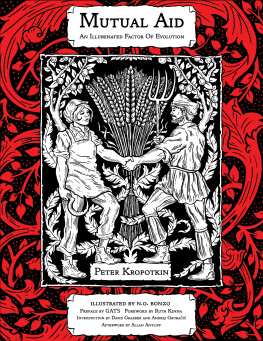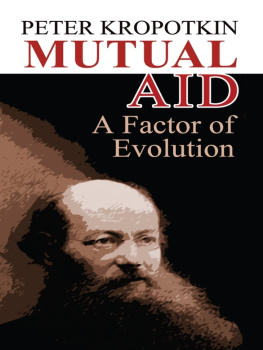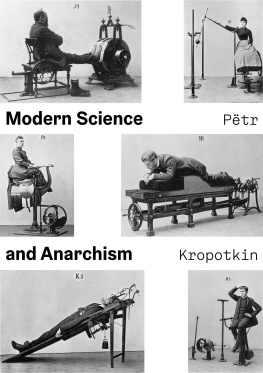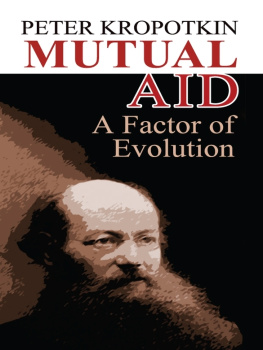THE PLACE OF ANARCHISM IN SOCIALISTIC EVOLUTION
PART I.
You must often have asked yourselves what is the cause of Anarchism, and why, since there are already so many Socialist schools, it is necessary to found an additional onethat of Anarchism. In order to answer this question I will go back to the close of last century.
You all know the characteristics which marked that epoch: there was an expansion of intelligence, a prodigious development of the natural sciences, a pitiless examination of accepted prejudices, the formation of a theory of Nature based on a truly scientific foundation, observation and reasoning. In addition to these there was criticism of the political institutions bequeathed to Humanity by preceding ages, and a movement towards that ideal of Liberty, Equality, and Fraternity which has in all times been the ideal of the popular masses. Fettered in its free development by despotism and by the narrow selfishness of the privileged classes, this movement, being at the same time favoured by an explosion of popular indignation, engendered the Great Revolution which had to force its way through the midst of a thousand obstacles both without and within.
The Revolution was vanquished, but its ideas remained. Though at first persecuted and derided, they became the watchword for a whole century of slow evolution. The history of the nineteenth century is summed up in an effort to put in practice the principles elaborated at the end of last century: this is the lot of revolutions: though vanquished they establish the course of the evolution which follows them. In the domain of politics these ideas are abolition of aristocratic privileges, abolition of personal government, and equality before the law. In the economic order the Revolution proclaimed freedom of business transactions; it said"Sell and buy freely. Sell, all of you, your products, if you can produce, and if you do not possess the implements necessary for that purpose but have only your arms to sell, sell them, sell your labour to the highest bidder, the State will not interfere! Compete among yourselves, contractors! No favour shall be shown, the law of natural selection will take upon itself the function of killing off those who do not keep pace with the progress of industry, and will reward those who take the lead."
The above is at least the theory of the Revolution of 1789, and if the State intervenes in the struggle to favour some to the detriment of others, as we have lately seen when the monopolies of mining and railway companies have been under discussion, such action is regarded by the liberal school as a lamentable deviation from the grand principles of the Revolution.
What has been the result? You know only too well, both women and men, idle opulence for a few and uncertainty for the morrow and misery for the greater number; crisis and wars for the conquest of markets, and a lavish expenditure of public money to find openings for industrial speculators. All this is because in proclaiming liberty of contract an essential point was neglected by our fathers. Not but what some of them caught sight of it, the best of them earnestly desired but did not dare to realise it. While liberty of transactions, that is to say a conflict between the members of society, was proclaimed, the contending parties were not equally matched, and the powerful, armed for the contest by the means inherited from their fathers, have gained the upper hand over the weak. Under such conditions the millions of poor ranged against a few rich could not do otherwise than give in.
Comrades! you have often asked yourselves"Whence comes the wealth of the rich? Is it from their labour?" It would be a mockery to say that it was so. Let us suppose that M. Rothschild has worked all his life: well, you also, every one of you working men have also laboured: then why should the fortune of M. Rothschild be measured by hundreds of millions while your possessions are so small? The reason is simple: you have exerted yourselves to produce by your own labour, while M. Rothschild has devoted himself to accumulating the product of the labour of othersthe whole matter lies in that.
But some one may say to me;"How comes it that millions of men thus allow the Rothschilds and the Mackays to appropriate the fruit of their labour?" Alas, they cannot help themselves under the existing social system! But let us picture to our minds a city all of whose inhabitants find their lodging, clothing, food and occupation secured to them, on condition of producing things useful to the community, and let us suppose a Rothschild to enter this city bringing with him a cask full of gold. If he spends his gold it will diminish rapidly; if he locks it up it will not increase, because gold does not grow like seed, and after the lapse of a twelvemonth he will not find 110 in his drawer if he only put 100 into it. If he sets up a factory and proposes to the inhabitants of the town that they should work in it for four shillings a day while producing to the value of eight shillings a day they reply"Among us you'll find no one willing to work on those terms. Go elsewhere and settle in some town where the unfortunate people have neither clothing, bread, nor work assured to them, and where they will consent to give up to you the lion's share of the result of their labour in return for the barest necessaries of life. Go where men starve! there you will make your fortune!"
The origin of the wealth of the rich is your misery. Let there be no poor, then we shall have no millionaires.
The facts I have just stated were such as the Revolution of last century did not comprehend or else could not act upon. That Revolution placed face to face two opposing ranks, the one consisting of a hungry, ill-clad army of former serfs, the other of men well provided with means. It then said to these two arrays"Fight out your battle." The unfortunate were vanquished. They possessed no fortunes, but they had something more precious than all the gold in the worldtheir arms; and these arms, the source of all wealth, were monopolised by the wealthy. Thus we have seen those immense fortunes which are the characteristic feature of our age spring up on all sides. A king of the last century, "the great Louis the Fourteenth" of mercenary historians, would never have dreamed of possessing a fortune such as are held by those kings of the nineteenth century, the Vanderbilts and the Mackays.
On the other hand we have seen the poor reduced still more and more to toil for others, and while those who produced on their own account have rapidly disappeared, we find ourselves compelled under an ever increasing pressure to labour more and more to enrich the rich. Attempts have been made to remove these evils. Some have said"Let us give equal instruction to all," and forthwith education has been spread abroad. Better human machines have been turned out, but these educated machines still labour to enrich others. This illustrious scientist, that renowned novelist, despite their education are still beasts of burden to the capitalist. Instruction improves the cattle to be exploited but the exploitation remains. Next, there was great talk about association, but the workers soon learned that they could not get the better of capital by associating their miseries, and those who cherished this illusion most earnestly were compelled to turn to Socialism.












